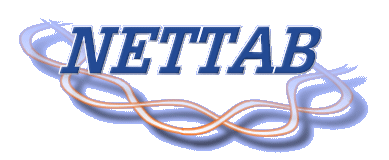
|
Workflows management:
new abilities for the biological information overflow 5-7 October, 2005, Second University of Naples, Naples, Italy |
Overview
NETTAB 2005 workshop is organized in sessions and open discussions.
Invited speakers will present the state of art of the session's topic,
a number of submissions will be accepted for oral presentation, and a
poster session is also foreseen.
The Call for Papers is now closed!
NETTAB 2005 Call for Papers
It is well known that bioinformatics has to cope with one of the largest amounts of information in all knowledge domains. This information is exponentially increasing in volume, so very soon it will no longer be locally manageable, is distributed over the network, has heterogeneous data structures and information systems and differing semantics.
The biomedical research domain is one of the fastest evolving research areas. New knowledge and hypotheses are accumulated daily, leading to new data and elaboration needs. These are often peculiar and different from one application domain to another. So, the development of general purpose applications is difficult and limitated to basic tools.
Biological information is made available to researchers through web sites. Biologists connect to many sites and switch among them to submit and retrieve preliminary and intermediate data. Results are often achieved integrating data manually. Access to this huge amount of information requires complex searching and retrieval software. They can be developed to perform this integration activity, provided that they are taught: the semantics of the information, how to link data and how to pipe retrieval and analysis steps.
A workflow is "a computerized facilitation or automation of a business
process, in whole or part".
Its main goal is the implemention of data analysis processes in standardized
environments.
Its main advantages relate to:
- effectiveness: being an automatic procedure, it frees the bioscientist from repetitive interactions with the web and it supports good practice,
- reproducibility: analysis can be replicated over time,
- reusability: intermediate results can be reused,
- traceability: the workflow is carried out in a transparent analysis environment where data provenance can be checked and/or controlled.
Implementation of workflow management software has already started. In recent years, we have seen Biopipe, an add-on to bioperl, and GPipe, an extension of the Pise interface. More recently, more sophisticated tools have been developed: EBI's Taverna, that is part of the myGrid project, IBM's Bioinformatics Workflow Builder Interface (BioWBI), Wildfire and SciTegic's Pipeline Pilot.
Workflow systems can also support a better interactive management of flows of data and analysis, not necessarily encoded in an automated pipeline. Advantages of moving from an interactive to an automated approach to biological information management are clear. Automation is quickly improving as to available technologies and tools and their diffusion in the biomedical domain.
Web Services have been implemented by EBI and NCBI. Technologies related to registries of Web Services are also emerging, e.g. bioMOBY.
Submitted contributions should address one or more of the following topics:
- Technologies and technological platforms of interest to the field,
with emphasis on:
- Web Services (SOAP, WSDL, WSFL, UDDI, ....)
- Web Services Choreography and Orchestration
- Semantic Web (RDF, LSID, OWL, ...)
- comparison of available technologies, limitations, pros and cons
- Knowledge representation
- Biological data and knowledge modeling tools
- Ontologies, Databases and Applications of Semantics in Bioinformatics
- Workflow management systems in bioinformatics
- implementations of web services
- implementations of registries
- reuse and versioning of web services and workflows
- workflow management systems
- web interfaces for accessing and executing workflows
- interactive systems to support work flows
- Applications of workflow management systems in bioinformatics
- Methodologies for life sciences analysis: gene expression, genome annotation, mass spec peptide fragment identification, etc...
- Encoding of the above in workflows
- Case studies
- Scenarios and use cases
Scientific Programme
Overview -
Invited Speakers
Programme
Abstracts
Presentations
Call for Papers
Overview
Scope -
Topics
Type of contributions
Deadlines
Registration Form
Overview
Subscribe mailing list
Register to the Workshop
Useful Info
Contacts -
How to reach
Deadlines -
Hotels
Fees -
External links
Workshop Organization
Scientific Committee
Organizing Committee
Institutes & Societies
Sponsors